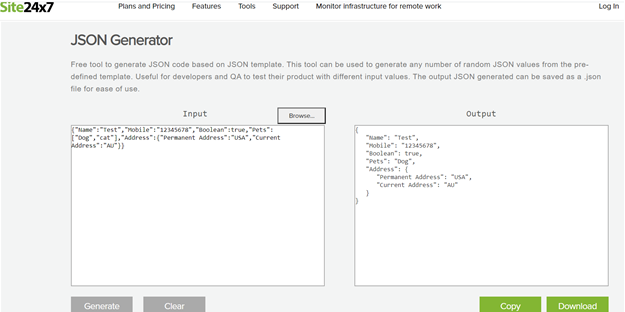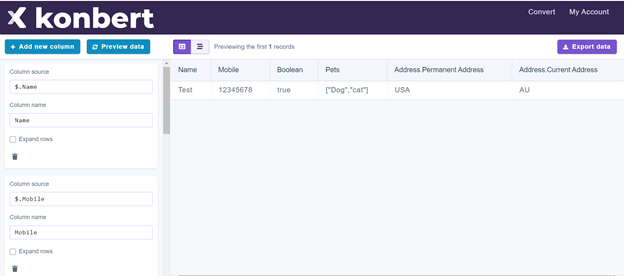
Let’s talk about JSON, it’s features and how is it helpful for us. Moreover, learn about the validating, parsing, formatting, etc., and other JSON editor resources available online through this article below.
Due to the proliferation of the internet, JavaScript has found itself in several unexpected contexts. There is no denying its importance as a programming language in today’s cutting-edge technology. It was created with the intention of enlarging the web, and it did so by incorporating javascript and JSON additions.
It was Douglas Crockford who, in the early 2000s, laid down the parameters for JSON. And it is now universally accepted as the standard computer format for storing data in an organized, human-readable form
The JavaScript Object Notation (JSON) is a lightweight data format for storing and exchanging information. And is very simple to understand, in fact.
A person’s JSON representation is seen in the example below.
{
"name": "Miller John",
"mobile": "897654321",
"age": 45,
"address": {
"city": "New York",
"country": "USA"
}
}What has been laid out above sheds light on several facets of a person’s nature. In it, you’ll find a contact’s name, as well as their cell phone and mailing address. For example, a client can provide a web server a data structure, and the server can use that to carry out a number of tasks, including displaying or preserving the information.
The data types string, boolean, list, integer, object, and null are all supported by the JSON format. As a subset of JavaScript, the JSON representation is used by all mainstream programming languages, making it a strong candidate for cross-lingual data transmission.
JSON: Why Use It?
Extensible Markup Language (XML) was the only language used for open data interchange. Now javascript is one of the best possibilities available, thanks to improvements in open data sharing that have expanded developers’ toolkits. The first thing that comes to mind when we talk about JSON with a developer is how lightweight it is in comparison to other open data interchange options. API integration is used for more than just this, though.
Fast
Because of the nature of XML software, the parsing process can take a while. The memory-intensive dom-manipulation libraries needed to process big XML files are one possible cause of this problem. We can reduce expenses and improve processing performance because JSON uses less data overall.
Readable
JSON has a straightforward and understandable structure. Whatever language we use, it’s easier to translate domain objects.
Structured Data
In contrast to XML’s tree structure, JSON has a “map” structure. Even while the key-value pair may limit our flexibility in some situations, the final data model is intuitive and easy to understand.
19 Online JSON Editor, Parser and Formatter Tools
There is a wide selection of JSON tools, each with its own peculiarities and limitations. The requirements of the individual determine which instruments should be used. Regardless, learning about these resources will help us use them efficiently to meet your requirements.
1. JSONCompare

JSONCompare is a useful tool for working with and validating JSON files. Multiple JSON files can be uploaded and verified at once. Moreover, you can merge or compare two JSON objects.
2. JsonFormatter

JsonFormatter is useful for checking and enhancing the quality of JSON data, as well as for implementing consistent formatting. A tree structure is provided for perusing our JSON-formatted data. Additionally, it has a JSON editor, JSON cleaner, JSONLint, and a JSON validator, as well as tools for converting JSON to CSV and XML.
3. Online JSON Tools

The onlineJSONtools package is a set of JSON utilities designed to make working with JSON data structures easier. The site’s JSON tools are all simple, intuitive, and free to use. Moreover, there is no difference in operation between the various utilities; they all read JSON and provide output in the same way.
4. JSON Editor Online

JSONeditoronline is a web-based tool for working with and modifying JSON files. In addition to showing the tree structure, this instrument does a lot more besides.
5. JSON Formatter

Some of the unique features of this Chrome extension include support for JSON and JSOP, syntax highlighting, collapsible trees with indentation guides, clickable URLs, and a choice between raw and parsed JSON.
6. JSON Formatter

JSONformatter is a real-time tool for reading, validating, altering, and improving JSON data through formatting and parsing. We get a natural feel for editing JSON with this powerful, feature-rich, and intuitive tool.
To validate and format the input JSON, simply enter or paste the JSON data and then click the format/validate button. In the second editor, you can examine the processed and formatted JSON.
Furthermore, we may load JSON data from.json or.txt files via the software. As an added bonus, the editor’s options menu allows you to do things like copy, clear, prettify, minify, and download JSON data.
7. JSON Formatter Online

A tree editor, a code editor, and a plain text editor are only some of the editing modalities available in JSONformatter-online. With this editor, we can add a powerful new feature to your web app. CommonJS modules, AMD modules, and regular JavaScript files can all be used to load the library.
8. JSON Parser Online
This JSON Parser allows you to easily parse and evaluate JSON data by transforming it into a string. Formatting, displaying, and indexing JSON objects are also capabilities offered by this view. In this case, it may also provide the JSON data to the parser via an HTML form submission. It is possible to use the Get and POST methods.
9. CSV JSON

As a developer, you will increasingly need to convert formats. When compared to CSV, JSON is a more permanent DIY option. It’s great that session can be saved and shared for future reference.
10. Site24x7

Create new JSON code based on the existing JSON template. An unlimited number of random JSON structures can be generated by this application based on a specified template. Developers and QA testers can put their products through their paces by using a wide range of input values. The JSON result can be saved as a.json file for later use.
11. JSON to SQL

Tables can be generated from JSON data with the help of Numidian JSON. New table columns can be added before exporting to JSON, SQL, or CSV formats. Converting from CSV or JSON to SQL, JSON, SQLite, MYSQL, or PostgreSQL is another service provided by Numidian JSON.
12. JSON Viewer

It’s a browser add-on for Google Chrome that makes it easy to inspect and examine JSON data returned by any web service or API. It gives great opportunities to prettify JSON.
It provides a visual interface for working with JSON, whether to clean it up or simply explore its aspects, which is useful for developers. Server response, or the provided JSON, can be visualized with the help of a chart provided by JSON-viewer. In addition, breadcrumb navigation of JSON attributes is supported.
13. JSON Buddy

The JSON Buddy integrated text editor has syntax-coloring, auto-completion, and folding to make it easy to edit and generate JSON documents. In addition to a free command-line JSON validator, the JSON editor for Windows, validator, and editor, JSON data converter, and JSON schema validator, JSON buddy provides a number of other useful tools.
14. Code Beautify

In a matter of seconds, you may have your JSON code ready for consumption with the help of this handy tool. All we have to do is submit a JSON file (we can either upload JSON data or paste the JSON code), and we’ll get back a tree structure that may be expanded and contracted as needed. When an image URL is included in the data, this Viewer will show a preview of the image.
15. JSONLint

JSONLint checks and formats JSON files for validity. JSONLint will tidy up and evaluate our tangled JSON code when we copy and paste, enter, or input a URL directly into the editor.
16. JSON Editor

Using the software, we can transform JSON to XML, TSV, HTML, or CSV.
17. Formatter and Validator

Since the JSON data is sometimes shown without line breaks solely to conserve space, the JSON Formatter was designed to aid developers in debugging. Because of this, grasping its meaning and significance becomes a formidable challenge. This tool helps us deal with the issue at hand by enhancing the readability and maintainability of the JSON data we’ll be working with.
In addition to these enhancements, it also implemented comprehensive JSON validation according to the description supplied by Douglas Crockford of json.org in RFC 4627, which greatly enhanced the debugging capabilities. It has since been improved so that it can verify compliance with a wider variety of JSON standards and with up-to-date norms like RFC 8259 and ECMA-404.
18. JSON Mate

As well as being able to import JSON data from an external API, JSON Mate also serves as a JSON editor, JSON inspector, and JSON beautifier/uglyizer. Simply copy and paste your JSON code into the editor’s input area to get a clean, hierarchical representation of your data. When we click the “visualize JSON” button, we can see what our JSON code looks like in a graphical representation.
19. JSON Formatter

JSON formatter live is a free and open-source JSON editor that does not store user data, can be navigated entirely via the keyboard, and displays inline error messages as you type. What’s more, it’s available as a Progressive Web App that can be downloaded and set up on your device.
Conclusion
In closing, I hope the JSON resources I’ve outlined above are useful in your professional endeavors.



